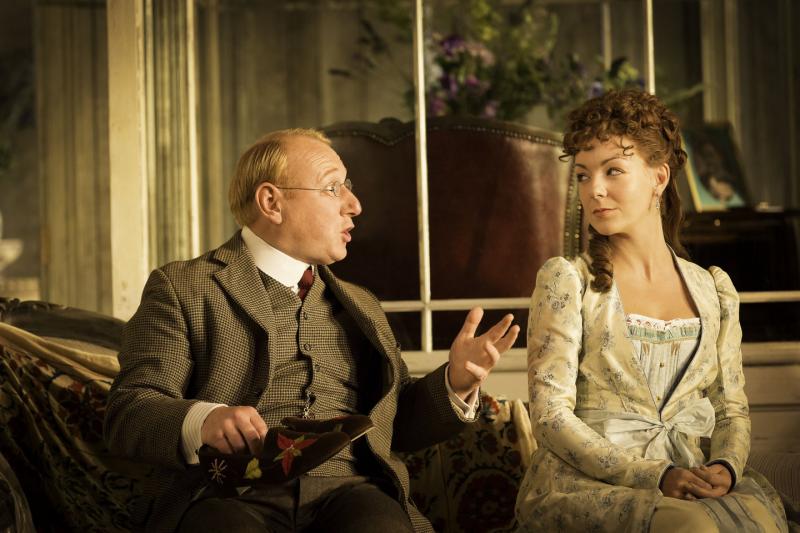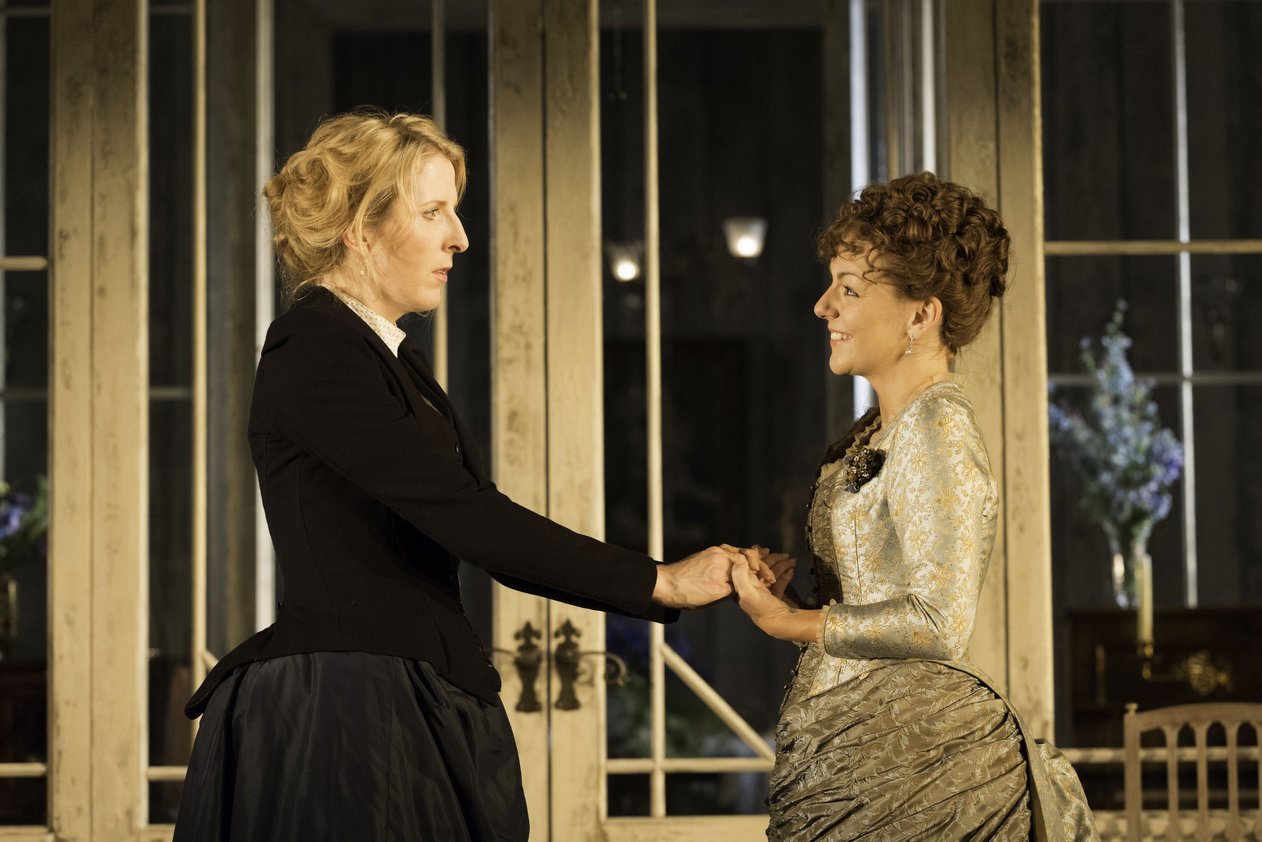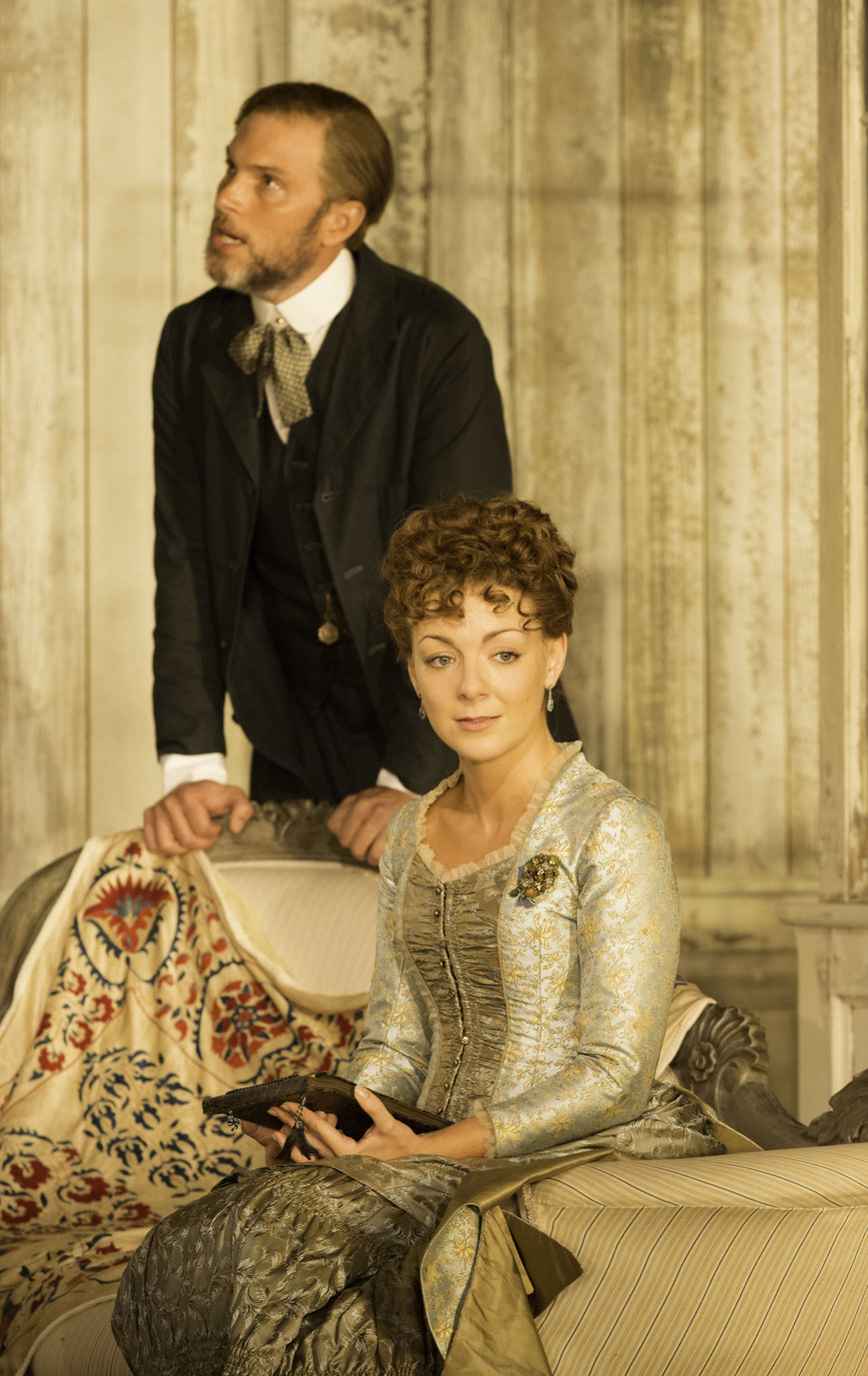Hedda Gabler, Old Vic | reviews, news & interviews
Hedda Gabler, Old Vic
Hedda Gabler, Old Vic
Ibsen's heroine draws new depths from the West End's sweetheart

Hedda Gabler – the doomy tragedy, the one with the pistol, the “female Hamlet”. We all know the score when it comes to Ibsen. All, that is, except apparently for Sheridan Smith, who recently admitted in an interview that she hadn’t heard of the play before she was asked to take on the lead.
Smaller than almost everyone else on stage, and disappearing into sofas, melting into glass-panelled walls, or just willing herself into invisibility while rigidly still in a chair, Smith’s Hedda hasn’t the joyous physical authority of a Blanchett or an Eve Best. This heroine’s self-dramatising manipulations come unwillingly – and all the more desperately for that. Denied the escape she desires (Mackmin’s silent prologue sets freely billowing curtains against closing doors – a visual idée fixe that haunts the rest of the action) she waits and watches, lashing out only when provoked, like the huntress Brian Friel’s new translation casts her as.
It’s a production that isn’t scared to play for laughs
The opening is all rictus smiles, gripped and pinched into agonies of politeness with Anne Reid’s prattling Aunt Juliana, relieved only by the swift wit and repartee that can often find itself neglected among all the tragedy. It’s a production that isn’t scared to play for laughs, lacing the biggest of these (directed at George’s ecstatic response to the news of his wife’s pregnancy) with sugared poison, as we see Smith’s Hedda in the background gearing up for her own “beautiful, final gesture”.
While the early scenes of acid retorts and adamantine sharpness feel at times just the tiniest bit over-worked, there is nothing fussy about Smith’s instinctual release in the latter half of the play. Mackmin and Friel’s pacing allows for a steadily rising acceleration that bursts into brutal climax almost before we realise it. The monotone gabblings of the opening give way to a gradually extending range of emotion and expression, to which the final bloody act feels like the most natural conclusion – social conformity and suppression giving way to the assertion of self. Mackmin surrounds Smith with a serious supporting cast, not least among which is Fenella Woolgar (pictured right with Smith) as Thea Elvsted. Aided by Friel’s additions, the nervy Thea offers a more worthy foil to Hedda, a viable alternative vision of future womanhood rather than a figure of fun. Woolgar’s physical tension and absolute discomfort sits well against Smith’s control, her careful, consciously swaying walk.
Mackmin surrounds Smith with a serious supporting cast, not least among which is Fenella Woolgar (pictured right with Smith) as Thea Elvsted. Aided by Friel’s additions, the nervy Thea offers a more worthy foil to Hedda, a viable alternative vision of future womanhood rather than a figure of fun. Woolgar’s physical tension and absolute discomfort sits well against Smith’s control, her careful, consciously swaying walk.
Leading the men is Adrian Scarborough as George Tesman. If there is a weakness in this production it’s that we can’t quite understand how his overgrown schoolboy of an academic, soft and sensitive to all the women in his life, could ever have married Smith’s Hedda. Ibsen’s explanation always feels a little token and seems no less so in Friel’s hands, yet perhaps Scarborough’s wishful (and wilful) blindness, his eager re-interpretation of Hedda’s violent act of destruction, goes some way toward furnishing an answer.
 While Daniel Lapaine’s Loevborg (pictured right with Smith) generates little heat with Smith, his vacant self-involvement allows this to become even more a self-wrought tragedy. This isn’t, we see, about love or even infatuation, simply a calculated exercise in control. But if ever this exercise threatens to get too heavy we always have Darrell D’Silva’s devilish Judge Brack, endowed here with a fondness for American neologisms, whose levity lend a sinister edge to the seriousness of his intentions.
While Daniel Lapaine’s Loevborg (pictured right with Smith) generates little heat with Smith, his vacant self-involvement allows this to become even more a self-wrought tragedy. This isn’t, we see, about love or even infatuation, simply a calculated exercise in control. But if ever this exercise threatens to get too heavy we always have Darrell D’Silva’s devilish Judge Brack, endowed here with a fondness for American neologisms, whose levity lend a sinister edge to the seriousness of his intentions.
A few moments jar in their contemporary spoken rhythms, but Friel’s translation also achieves some elegant felicities. “I had danced myself to a standstill”, explains Hedda of her unexpected marriage to Tesman; “You burrowed into me” accuses Loevborg of Hedda’s parasitical early attention to him. It’s a shame though that Simon Baker’s sound design can’t match it for musicality. While onstage melodrama is largely implied rather than stated, exiled to silent transitional moments or deferred until the very close, a heavy 19th-century soundtrack tacks lead weights onto Smith’s delicate inflections, loading the drama – and the pistol – unfairly and before time.
This is a classic Hedda Gabler with an unexpectedly classic heroine. Smith, playing against type, plays with the grain of her skill, drawing out the nimble, mercurial aspects of a woman we are almost convinced is a pure villain. In that “almost”, though, lives a world of fertile uncertainty, and one that Smith inhabits with relish. She may be the nation’s theatrical sweetheart, but Sheridan Smith makes for one hell of a bitch.
MORE IBSEN ON THEARTSDESK
Ghosts, Duchess Theatre (2010). Iain Glen makes directorial debut with a straightforward take starring Lesley Sharp
The Master Builder, Almeida Theatre (2010). Passions blow hot and cold in this uneven production starring Gemma Arterton and Stephen Dillane
Emperor and Galilean, National Theatre (2011). Power and pace help to exhume Ibsen's Romano-Christian epic starring Andrew Scott
Judgement Day, The Print Room (2011). Ibsen's last play has its issues but emerges strongly in new adaptation with Michael Pennington
The Lady From the Sea, Rose Theatre, Kingston (2012). Joely Richardson takes on the Ibsen heroine her mother and sister made their own
A Doll's House, Young Vic (2012). Period setting yields a contemporary tragedy adapted by Simon Stephens and starring Hattie Morahan
Love's Comedy, Orange Tree Theatre (2012). Early Ibsen finds the playwright in his awkward adolescence
A Doll's House, Royal Exchange (2013). Ibsen in the round loses none of its power to cast a spell
Public Enemy, Young Vic (2013). The horrors of local politics still chime in Richard Jones's queasy production of an Ibsen masterpiece
Ghosts, Almeida Theatre (2013). Richard Eyre and Lesley Manville shine light into Ibsen's dark thriller of family misfortunes
Peer Gynt, Théâtre National de Nice (2014). Irina Brook's song-and-dance Ibsen entertains, but misses the darker shades
The Wild Duck, Belvoir Sydney (2014). Heartbreaking adaptation mixes naturalism and forensic examination
Little Eyolf, Almeida Theatre (2015). Strong women and one weak man in Ibsen's swift study of isolation and guilt
The Master Builder, Old Vic (2016). Ralph Fiennes stars in Ibsen's unsettling mix of the real and the supernatural
Hedda Gabler, National Theatre (2016). Ivo van Hove makes an uneven Southbank debut
rating
Share this article
The future of Arts Journalism
You can stop theartsdesk.com closing!
We urgently need financing to survive. Our fundraising drive has thus far raised £49,000 but we need to reach £100,000 or we will be forced to close. Please contribute here: https://gofund.me/c3f6033d
And if you can forward this information to anyone who might assist, we’d be grateful.

Subscribe to theartsdesk.com
Thank you for continuing to read our work on theartsdesk.com. For unlimited access to every article in its entirety, including our archive of more than 15,000 pieces, we're asking for £5 per month or £40 per year. We feel it's a very good deal, and hope you do too.
To take a subscription now simply click here.
And if you're looking for that extra gift for a friend or family member, why not treat them to a theartsdesk.com gift subscription?
more Theatre
 Little Brother, Soho Theatre review - light, bright but emotionally true
This Verity Bargate Award-winning dramedy is entertaining as well as thought provoking
Little Brother, Soho Theatre review - light, bright but emotionally true
This Verity Bargate Award-winning dramedy is entertaining as well as thought provoking
 The Unbelievers, Royal Court Theatre - grimly compelling, powerfully performed
Nick Payne's new play is amongst his best
The Unbelievers, Royal Court Theatre - grimly compelling, powerfully performed
Nick Payne's new play is amongst his best
 The Maids, Donmar Warehouse review - vibrant cast lost in a spectacular-looking fever dream
Kip Williams revises Genet, with little gained in the update except eye-popping visuals
The Maids, Donmar Warehouse review - vibrant cast lost in a spectacular-looking fever dream
Kip Williams revises Genet, with little gained in the update except eye-popping visuals
 Ragdoll, Jermyn Street Theatre review - compelling and emotionally truthful
Katherine Moar returns with a Patty Hearst-inspired follow up to her debut hit 'Farm Hall'
Ragdoll, Jermyn Street Theatre review - compelling and emotionally truthful
Katherine Moar returns with a Patty Hearst-inspired follow up to her debut hit 'Farm Hall'
 Troilus and Cressida, Globe Theatre review - a 'problem play' with added problems
Raucous and carnivalesque, but also ugly and incomprehensible
Troilus and Cressida, Globe Theatre review - a 'problem play' with added problems
Raucous and carnivalesque, but also ugly and incomprehensible
 Clarkston, Trafalgar Theatre review - two lads on a road to nowhere
Netflix star, Joe Locke, is the selling point of a production that needs one
Clarkston, Trafalgar Theatre review - two lads on a road to nowhere
Netflix star, Joe Locke, is the selling point of a production that needs one
 Ghost Stories, Peacock Theatre review - spirited staging but short on scares
Impressive spectacle saves an ageing show in an unsuitable venue
Ghost Stories, Peacock Theatre review - spirited staging but short on scares
Impressive spectacle saves an ageing show in an unsuitable venue
 Hamlet, National Theatre review - turning tragedy to comedy is no joke
Hiran Abeyeskera’s childlike prince falls flat in a mixed production
Hamlet, National Theatre review - turning tragedy to comedy is no joke
Hiran Abeyeskera’s childlike prince falls flat in a mixed production
 Rohtko, Barbican review - postmodern meditation on fake and authentic art is less than the sum of its parts
Łukasz Twarkowski's production dazzles without illuminating
Rohtko, Barbican review - postmodern meditation on fake and authentic art is less than the sum of its parts
Łukasz Twarkowski's production dazzles without illuminating
 Lee, Park Theatre review - Lee Krasner looks back on her life as an artist
Informative and interesting, the play's format limits its potential
Lee, Park Theatre review - Lee Krasner looks back on her life as an artist
Informative and interesting, the play's format limits its potential
 Measure for Measure, RSC, Stratford review - 'problem play' has no problem with relevance
Shakespeare, in this adaptation, is at his most perceptive
Measure for Measure, RSC, Stratford review - 'problem play' has no problem with relevance
Shakespeare, in this adaptation, is at his most perceptive
 The Importance of Being Earnest, Noël Coward Theatre review - dazzling and delightful queer fest
West End transfer of National Theatre hit stars Stephen Fry and Olly Alexander
The Importance of Being Earnest, Noël Coward Theatre review - dazzling and delightful queer fest
West End transfer of National Theatre hit stars Stephen Fry and Olly Alexander

Add comment